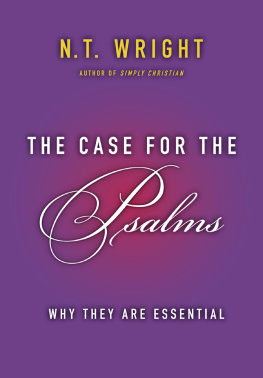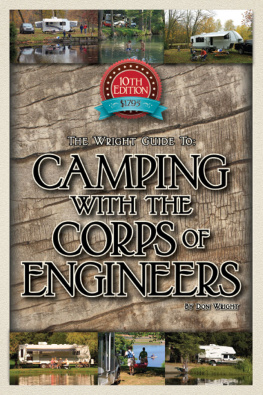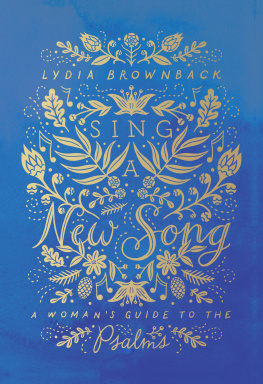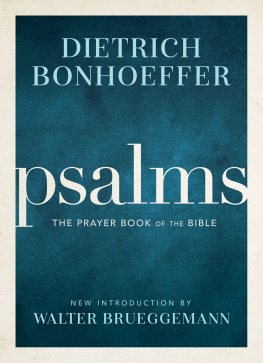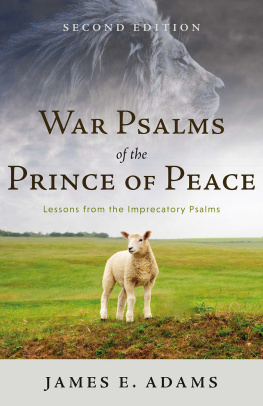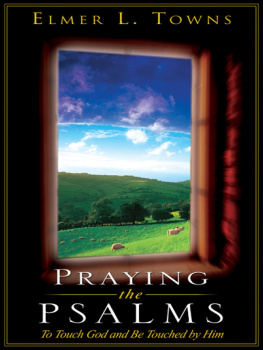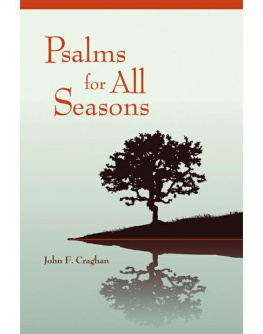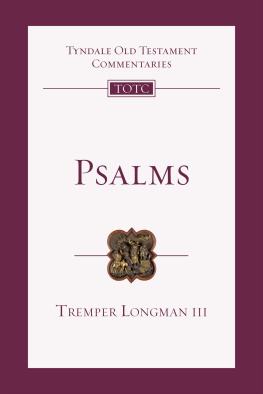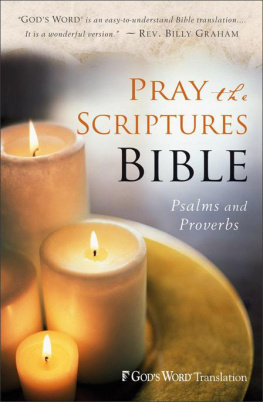Wright - The case for the Psalms: why they are essential
Here you can read online Wright - The case for the Psalms: why they are essential full text of the book (entire story) in english for free. Download pdf and epub, get meaning, cover and reviews about this ebook. City: San Francisco, year: 2013;2012, publisher: HarperCollins;HarperOne, genre: Religion. Description of the work, (preface) as well as reviews are available. Best literature library LitArk.com created for fans of good reading and offers a wide selection of genres:
Romance novel
Science fiction
Adventure
Detective
Science
History
Home and family
Prose
Art
Politics
Computer
Non-fiction
Religion
Business
Children
Humor
Choose a favorite category and find really read worthwhile books. Enjoy immersion in the world of imagination, feel the emotions of the characters or learn something new for yourself, make an fascinating discovery.
- Book:The case for the Psalms: why they are essential
- Author:
- Publisher:HarperCollins;HarperOne
- Genre:
- Year:2013;2012
- City:San Francisco
- Rating:5 / 5
- Favourites:Add to favourites
- Your mark:
- 100
- 1
- 2
- 3
- 4
- 5
The case for the Psalms: why they are essential: summary, description and annotation
We offer to read an annotation, description, summary or preface (depends on what the author of the book "The case for the Psalms: why they are essential" wrote himself). If you haven't found the necessary information about the book — write in the comments, we will try to find it.
The case for the Psalms: why they are essential — read online for free the complete book (whole text) full work
Below is the text of the book, divided by pages. System saving the place of the last page read, allows you to conveniently read the book "The case for the Psalms: why they are essential" online for free, without having to search again every time where you left off. Put a bookmark, and you can go to the page where you finished reading at any time.
Font size:
Interval:
Bookmark:

For Annabel
I shall walk at liberty, for I have sought your precepts.
Psalm 119.45
Contents
THIS BOOK IS A PERSONAL PLEA. THE PSALMS, which make up the great hymnbook at the heart of the Bible, have been the daily lifeblood of Christians, and of course the Jewish people, from the earliest times. Yet in many Christian circles today, the Psalms are simply not used. And in many places where they are still used, whether said or sung, they are often reduced to a few verses to be recited as filler between other parts of the liturgy or worship services. In the latter case, people often dont seem to realize what theyre singing. In the former case, they dont seem to realize what theyre missing. This book is an attempt to reverse those trends. I see this as an urgent task.
Suppose the Psalms had been lost and had never been printed in any Bibles or prayer books. Suppose they then turned up in a faded but still legible scroll, discovered by archaeologists in the sands of Jordan or Egypt. What would happen? When deciphered and translated, they would be on the front page of every newspaper in the world. Many scholars from many disciplines would marvel at the beauty and content of these ancient worship songs and poems.
The Psalms are among the oldest poems in the world, and they still rank with any poetry in any culture, ancient or modern, from anywhere in the world. They are full of power and passion, horrendous misery and unrestrained jubilation, tender sensitivity and powerful hope. Anyone at all whose heart is open to new dimensions of human experience, anyone who loves good writing, anyone who wants a window into the bright lights and dark corners of the human soulanyone open to the beautiful expression of a larger vision of reality should react to these poems like someone who hasnt had a good meal for a week or two. Its all here.
And astonishingly, it doesnt get lost in translation. Most poetry suffers when translated into other languages because it relies for its effect on the sound and rhythm of the original words. Its true that the Hebrew of these poems is beautiful in itself for those who can experience it. But the Psalms rely for their effect on the way they set out the main themes. They say something from one angle and then repeat it from a slightly different one:
By the word of YHWH the heavens were made,
and all their host by the breath of his mouth. (33.6)
I will open my mouth in a parable;
I will utter dark sayings from of old. (78.2)
You search out my path and my lying down,
and are acquainted with all my ways. (139.3)
Even when this doesnt happen line by line, it often happens between different sections of a psalm or in the balance of the collection, or a part of it, as a whole.
The important point here is that some of the most important things we want to say remain just a little beyond even our best words. The first sentence is a signpost to the deep reality; the second, a signpost from a slightly different place. The reader is invited to follow both and to see the larger, unspoken truth looming up behind. This means that not only can the effect be maintained in translation, but the effect is itself one of the deepest things the Psalms are doing, making it clear that the best human words point beyond themselves to realities that transcend even high poetic description. (Something similar is achieved elsewhere in the Biblefor instance, in the provision in Genesis of two creation stories, offering two picture-language images for a reality that lies beyond either.)
All this, as I said, should capture the attention and generate the excitement of anyone sensitive to powerful writing on the great themes of human life. But for those who, in whatever way, stand in the spiritual traditions of Judaism and Christianity, there is all that and much, much more. That makes it all the more frustrating that the Psalms are so often neglected today or used at best in a perfunctory and shallow way.
In some parts of contemporary Christianity, the Psalms are no longer used in daily and weekly worship. This is so especially at points where there has been remarkable growth in numbers and energy, not least through the charismatic movements in various denominations. The enormously popular worship songs, some of which use phrases from the Psalms here and there but most of which do not, have largely displaced, for thousands of regular and enthusiastic worshipers, the steady rhythm and deep soul-searching of the Psalms themselves. This, I believe, is a great impoverishment.
By all means write new songs. Each generation must do that. But to neglect the churchs original hymnbook is, to put it bluntly, crazy. There are many ways of singing and praying the Psalms; there are styles to suit all tastes. That, indeed, is part of their enduring charm. I hope that one of the effects of this little book will be to stimulate and encourage those who lead worship in many different settings to think and pray about how to reintegrate the churchs ancient prayer book into the regular and ordinary life of their fellowships. The Psalms represent the Bibles own spiritual root system for the great tree we call Christianity. You dont have to be a horticultural genius to know what will happen to the fruit on the tree if the roots are not in good condition.
But Im not writing simply to say, These are important songs that we should use and try to understand. That is true, but it puts the emphasis the wrong way aroundas though the Psalms are the problem, and we should try to fit them into our world. Actually, again and again it is we, muddled and puzzled and half-believing, who are the problem; and the question is more how we can find our way into their world, into the faith and hope that shine out in one psalm after another.
As with all thoughtful Christian worship, there is a humility about this approach. Good liturgy, whether formal or informal, ought never to be simply a corporate emoting session, however Christian, but a fresh and awed attempt to inhabit the great unceasing liturgy that is going on all the time in the heavenly realms. (Thats what those great chapters, Revelation 4 and 5, are all about.) The Psalms offer us a way of joining in a chorus of praise and prayer that has been going on for millennia and across all cultures. Not to try to inhabit them, while continuing to invent nonpsalmic worship based on our own feelings of the moment, risks being like a spoiled child who, taken to the summit of Table Mountain with the city and the ocean spread out before him, refuses to gaze at the view because he is playing with his Game Boy.
In particular, I propose in this book that the regular praying and singing of the Psalms is transformative . It changes the way we understand some of the deepest elements of who we are, or rather, who, where, when, and what we are: we are creatures of space, time, and matter, and though we take our normal understandings of these for granted, it is my suggestion that the Psalms will gently but firmly transform our understandings of all of them. They do this in order that we may be changed, transformed, so that we look at the world, one another, and ourselves in a radically different way, which we believe to be Gods way. I hope my exposition of these themes will help to explain and communicate my own enthusiasm for the Psalms, but I hope even more that they will encourage those churches that have lost touch with the Psalms to go back to them as soon as possible, and those that use them but with little grasp of what theyre about to get inside them in a new way.
The Psalms thus transform what I have called our worldview. I use this term in a specific way that I have developed over the last twenty years. A worldview in this sense is like a pair of spectacles: it is what you look through, not what you look at . Worldviews, in this sense, are complex and consist of the swirling combination of stories, symbols, habitual praxis, and assumed answers to key questions (Who are we? Where are we? Whats wrong? Whats the solution? and What time is it?). This developed notion of worldview has its roots in some aspects of continental philosophy, though I have developed it slightly differently; I have set it all out in various places, such as the volumes in my series Christian Origins and the Question of God. There is, however, a quite different meaning of worldview that has recently become popular in some circles in America, particularly under the influence of Francis Schaeffer and his disciples. There it is used to refer to a basic kit of would-be Christian assumptions that for some reason have taken on a particular political slant. That is not what I am talking about, as will become clear.
Next pageFont size:
Interval:
Bookmark:
Similar books «The case for the Psalms: why they are essential»
Look at similar books to The case for the Psalms: why they are essential. We have selected literature similar in name and meaning in the hope of providing readers with more options to find new, interesting, not yet read works.
Discussion, reviews of the book The case for the Psalms: why they are essential and just readers' own opinions. Leave your comments, write what you think about the work, its meaning or the main characters. Specify what exactly you liked and what you didn't like, and why you think so.

